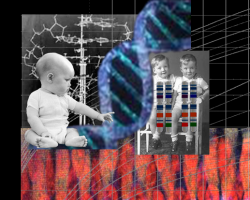
Child Emotion Center (Lemery-Chalfant)

At the Child Emotion Center, researchers explore early biological and environmental risk and protective factors for later mental health of children and young adults. Under the direction of the center's founder Professor Kathryn Lemery-Chalfant, trainees use long-term longitudinal studies to understand how genes and environments work together to influence development. Our methods include measures from multiple levels of analysis, such as genetic, physiological, behavioral, and social— in order to better understand mechanisms of development and brain-behavior relationships. The overarching goal of the Child Emotion Center is to identify pathways to resilience, or the ability to bounce back from stress and adversity, or sustain adaptive functioning under stress, and thrive in life.
CURRENT RESEARCH PROJECTS
Arizona Twin Project
The Arizona Twin Project is a long-term longitudinal research study spanning from infancy through adolescence. It is focused on understanding the influence of genetic and environmental factors on developmental pathways from early adversity through emotion dysregulation and epigenetic changes, to mental health. Positive family and social relationship are considered as resilience factors. Our geographical location makes us especially interested in examining these developmental processes among Hispanic families. Having an ethnically diverse sample allows us to consider the interplay between culture and genetics.
The Arizona Twin Project is funded by two main grants from the National Institutes of Health:
MPI’s Kathryn Lemery-Chalfant & Mary Davis, NICHD 2R01 HD086085, “Genetic and environmental origins of the development of pain in children.”
MPI’s Kathryn Lemery-Chalfant and Leah Doane, NICHD 2R01 HD079520-06, “Social and genetic contributions to children’s sleep, health and functioning.”
Wisconsin Twin Project
The overarching goal of the Wisconsin Twin Project is to uncover characteristics of children/adolescents and their environment that influence the development of mental health problems. It is a long-term longitudinal study that spans from infancy to mid-life, and we use computational developmental methods to understand risk and resilience. The disorders we focus on include internalizing disorders such as depression and anxiety, and externalizing disorders such as conduct disorder, attention deficit hyperactivity disorder (ADHD), and adult alcohol and drug use. We hope to reveal ways to prevent these problems and help individuals develop in healthy ways. The longitudinal study includes numerous environmental, physiological (e.g., cortisol and other hormones), and biological measures (e.g., MRI and fMRI), as well as observational assessments of emotion, temperament, and social relationships.
Additional funding for the Wisconsin Twin Project is under review at the National Institutes of Health:
MPIs Kathryn Lemery-Chalfant & Leslie Leve, NIMH 1U01MH136085-01, “Developing valid and scalable dimensional assessments of mental health problems from early childhood to adulthood.”
Early Steps Multisite Study
The Early Steps sample was screened and recruited from Women, Infants, and Children’s nutritional supplement centers when children were 2 years old (N= 731 racially and ethnically-diverse families) and families were selected as at risk on multiple domains. The families were randomly assigned to the Family Check-Up (FCU) preventative intervention, or a control group, and intensively assessed at ages 2, 3, 4, 5, 7, 8, 9, 10, 14, 16, 19, 22, and 24 (ongoing). The original Principal Investigators of the study are Professors Thomas Dishion, Daniel Shaw, and Melvin Wilson. Professor Lemery-Chalfant joined the PI team in 2014 and genotyped the participants in order to study how genetic background may moderate risk and resilience developmental processes for future mental health problems and drug and alcohol use.
Early Steps is funded by two main grants from the National Institutes of Health:
MPIs Erika Westling, Kathryn Lemery-Chalfant, Jazmin Brown-Iannuzzi, & Daniel Shaw, NIMH R01 MH131670, “Preventing adult mental health problems from early childhood in the contexts of genetic susceptibility, poverty, racism, and the COVID-19 pandemic.”
MPI’s Kathryn Lemery-Chalfant & Jenn-Yun Tein, NIDA R01 DA053740, “Parent-Child Interaction Dynamics Mediate Genetic and Prevention Effects on the Development of Adolescent Substance Use Disorders.”
Principal Investigators

Kathryn Lemery-Chalfant, Ph.D.
Director and Principal Investigator
Dr. Lemery-Chalfant has been a professor of psychology at Arizona State University for over 20 years. She obtained her bachelor’s degree from the University of Oregon’s Clark Honors College in 1994, and obtained her Ph.D. in psychology at the University of Wisconsin-Madison in 1999. Her research focuses on how genes and environments work together to influence child and adolescent development, and she has published over 100 scientific articles on this topic. Dr. Lemery-Chalfant launched the Arizona Twin Project in 2008 in order to understand how families can best support their children’s physical and social-emotional development. The Arizona Twin Project has since then expanded to the Southwest Twin Panel in 2024, to include families of twins from New Mexico into the study.

Leah Doane, Ph.D.
Principal Investigator
Leah Doane is a Professor in the Department of Psychology and Associate Dean of Graduate Initiatives in The College of Liberal Arts and Sciences. She received her Bachelor’s Degree in Psychology from Cornell University, her M.A. and Ph.D. in Human Development and Social Policy from Northwestern University, and completed a postdoctoral appointment at the University of Chicago in Psychiatry and Behavioral Neuroscience. Using culturally- and genetically-informed designs, her program of research centers on links between health behaviors, physiological stress processes, and everyday stressful experiences in childhood, adolescence and young adulthood from a developmental psychopathology framework.
Further, much of her work focuses on these processes in Latinx youth and families, and during times of transition, such as the transition to college. Doane was a William T. Grant Foundation Scholar and has been funded by the National Institutes for Health (NICHD), the Army Research Institute for the Behavioral and Social Sciences (ARI), and the Centers for Disease Control and Prevention (CDC). She has served in several leadership positions in the Department of Psychology including Developmental Graduate Training Area Head, Director of Faculty Success, and Associate/Deputy Chair.

Mary Davis, Ph.D.
Principal Investigator
Dr. Davis is a clinical health psychologist and Professor of Psychology. She also is currently Associate Chair in the Department of Psychology and Research Council Chair of the Center for Mindfulness, Compassion, and Resilience at ASU. She received her Bachelor’s degree in Bacteriology from University of Idaho and her Masters and Ph.D. in Psychology (Clinical Emphasis) from the University of Pittsburgh. She then joined the faculty as ASU. Dr. Davis examines how social and emotional and social risk and resilience factors shape adaptation to stress. Her work includes developing and testing interventions designed to bolster resilience, such as mindfulness, in the face of ongoing challenges associated with chronic pain, trauma, and aging. She has expertise in physiological and self-report assessment of the dynamic relations among interpersonal stress and joy, emotions, and pain in daily life and in laboratory settings. Her current collaboration with Drs. Lemery-Chalfant and Doane is supported by the National Institutes of Health (NICHD) to examine the environmental and genetic contributions to chronic pain in middle-childhood.

Candace Lewis, Ph.D.
Co-Investigator
Dr. Lewis is a neuroscientist who wants to revolutionize our understanding of health by exploring dynamic environmental and genetic influences on brain-behavior relationships. Candace grew up in Alaska and earned a Bachelor’s degree in Psychology from the University of Alaska Anchorage. Next, she earned a Ph.D. in Behavioral Neuroscience at Arizona State University on a Harry S. Truman Scholarship while investigating the effects of early life stress on addiction behavior and neuroepigenetics. Dr. Lewis received a Fulbright Fellowship to learn advanced neuroimaging and psychedelic research methods at the University Hospital of Zurich. She was also awarded the Science Foundation Arizona Bisgrove Fellowship to investigate the interplay between early experiences, epigenetics, physiology, and behavior. Taken together, her research centers around the age-old question of nature versus nurture with a modern twist. Dr. Lewis seeks to unravel how genetics and experiences continuously interact to shape neurobiology and behavior.
Staff

Becca Myers, M.S.
Project Coordinator
Becca is responsible for organizing the operational processes to support the research projects. She has experience with project management, regulatory matters, networking, mentorship, and financial reporting. Her academic interests include curiosity development and parental dyadic interactions within a family systems model.

Jennifer Kennedy, M.S.
Data Collection Coordinator
Jennifer has been apart of research at ASU for many years with her previous work on the Transiciones study and LivesMix project. Her role on the Arizona Twin Project has primarily been to improve communication among research team members, increase participation retention, and facilitate quality data collection.

Sierra Clifford, Ph.D.
Data and Methodology Coordinator
Dr. Clifford is a research scientist with expertise in quantitative and molecular genetic methods. She got her Ph.D. in developmental psychology at Arizona State University in 2017, and currently works on the Arizona Twin Project and Early Steps Project, doing data analysis and assisting with manuscript preparation. Her research interests include childhood temperament and gene-environment interplay (interaction and correlation).

Sarah Hidalgo, M.S.
Data Manager
Sarah is a graduate student in the Developmental Psychology doctoral program and a Data Manager for the Arizona Twin Project. She received her Masters in Family and Human Development at Arizona State University in 2018. Her primary research interests are prevention and intervention programs, specifically focused on eating disorder prevention, and body-esteem promotion of children and adolescents. Being a twin mother herself, she is grateful to get to work on ATP to get to learn more about twins and assist in researching this topic. Outside of research, she loves spending time with her three-year old twin daughters and husband, and exploring bookstores and coffee shops with her family.

Samantha Norem
Scheduling Coordinator
Sam started working on the Arizona Twin Project as an undergraduate research assistant and is now taking on a staff role. She works primarily with participant scheduling, engagement, and outreach. Sam is currently working on her Master’s in Clinical Mental Health Counseling from Grand Canyon University and has an interest in the resilience and development of children and adolescents. In her free time, Sam likes to read, play with her dog named Xena, and listen to a wide range of music.

Valeria Gutierrez
Outreach Coordinator
Valeria has been a part of the Arizona Twin Project since sophomore year as an undergraduate research assistant and now holds a staff position. Her role in the lab consists of working with Spanish-speaking participants, the recruitment of new families, and the management of our social media accounts. Valeria is working towards applying to Ph.D. programs to explore her research interests on the influence of cultural processes and ecological contexts on family dynamics and youth outcomes.
Collaborators

Carlos Valiente, Ph.D.
Collaborator
Dr. Valiente is a co-investigator for the Arizona Twin Project. He is a developmental scientist and Professor in the T. Denny Sanford School of Social and Family Dynamics at Arizona State University. Dr. Valiente received his Ph.D. in Family Science from Arizona State University.
Dr. Valiente studies children’s emotional, social, and academic functioning. He is especially interested in understanding when and why emotion and self-regulation are related to success in the academic domain. He also studies how parents, peers, and the social environment shape children’s self-regulation, social, and academic functioning. Dr. Valiente has also been involved in intervention research designed to promote students’ readiness for, and success in, early elementary school.

Samantha Miadich, Ph.D.
Collaborator
Dr. Miadich was previously a Postdoctoral Research Associate working on the Arizona Twin Project for three years and now is an Assistant Professor at the University of Massachusetts Lowell and collaborates with the team. Her program of research focuses on pediatric health psychology, specifically, examining prevalent chronic conditions (e.g., asthma, sleep problems, recurrent pain) from risk and resilience frameworks to delineate targets of intervention to improve child and adolescent outcomes. She incorporates novel methodologies, objective assessment, and advanced statistical modeling in her work to explicate processes that inhibit or promote health among children.

Reagan Breitenstein, Ph.D.
Collaborator
Dr. Breitenstein is currently an Assistant Professor of Psychology at Appalachian State University. Using psychobiological methods, objective sleep data, biological weight measurements, and twin designs, Dr. Breitenstein’s research concentrates on understanding genetic, environmental, and psychosocial factors that contribute to poor sleep, as well as associations between poor and inadequate sleep and various developmental outcomes across childhood and adolescence (e.g., weight indicators, stress physiology, academic achievement). Currently, she is also exploring how individual differences in cultural values and child temperament contribute to links between poor sleep, health, and academic outcomes in childhood and adolescence.

Jodi Swanson, Ph.D.
Collaborator
Dr. Swanson is an associate teaching professor in the School of Social and Family Dynamics at Arizona State University and has collaborated with the Arizona Twin Project for a number of years. She teaches courses on development-in-context across childhood and adolescence, family processes, and social science methodologies. Her research centers on self-regulation competence, especially at preschool and early elementary school, when many of the neural pathways in the brain begin to fire rapidly in the growth of these critically important skills, including focusing attention, managing emotions, inhibiting distraction, planning, persistence, and so on—and how parents and teachers can foster these.

Veronica Oro, Ph.D.
Collaborator
Dr. Oro was previously a graduate student working on the Arizona Twin Project. Broadly, Dr. Oro’s research examines genetic and environmental mechanisms underlying parent-offspring transmission of physical and mental health. Using the data of twin offspring and their parents, she attempts to determine the level of specificity at which symptomology clusters within families and whether environmental factors explain familial aggregation above and beyond the influence of shared genetics. Dr. Oro is particularly interested in the role sociocultural factors play in the etiology and manifestation of symptomology. Considering high rates of comorbidity across physical and mental health conditions, her research also elucidates shared genetic and environmental etiology across the two domains.

Gianna Rea-Sandin, Ph.D.
Collaborator
Dr. Rea-Sandin, formerly a graduate student in Developmental Psychology at Arizona State University, joined the Arizona Twin Project in 2016. Her research focuses on understanding the genetic and environmental factors that influence children's self-regulation and academic competence. Additionally, she is passionate about incorporating cultural perspectives into behavior genetics. Dr. Rea-Sandin is currently an Assistant Professor in the Division of General Pediatrics and Adolescent Health at the University of Minnesota.
Graduate Students

Emma Lecarie, M.A.
Graduate Student
Emma is a Clinical Psychology Ph.D. student at Arizona State University. Her research is focused on health processes, such as stress and sleep, in relation to mental health outcomes during the developmental periods of childhood and adolescence. She is particularly interested in the manifestation of internalizing symptoms across the pubertal transition, and understanding the role of genetic and environmental factors, including the effects of family dynamics and life stress, on pubertal development and subsequent symptomatology.

Eva Bartsch, M.A.
Graduate Student
Eva is a Clinical Psychology Ph.D. student at Arizona State University. Her research explores how health behaviors such as physical activity and sleep benefit mental and physical health outcomes through biological, psychological, and social mechanisms. She is particularly interested in studying the role of epigenetic mechanisms for the development and maintenance of chronic pain and internalizing symptoms. Her clinical training includes the use of evidence-based practices to improve coping skills, distress tolerance, and self-compassion.

Janna Pickett, M.A.
Graduate Student
Janna is a Ph.D. student in Developmental Psychology at Arizona State University. Her research focuses on understanding social development in childhood with a particular emphasis on the social influence of siblings. Janna loves to teach and hopes to continue doing so in her future career as a professor.

Savannah Ostner
Graduate Student
Savannah is a Ph.D. student in Clinical Psychology at Arizona State University. Broadly, her research examines the effect of gene-environment interplay on the development of psychopathology, as well as resilience, following early life stress. In particular, Savannah is interested in how environmental factors, such as parent-child interactions and early life stress, and individual factors, such as emotion regulation, can influence the development of psychopathology within the context of genetic risk. She is also interested in the role of epigenetic mechanisms underlying the development of psychopathology.

Alexys Murillo
Graduate Student
Alexys is a Ph.D. student in Developmental Psychology at Arizona State University. Her research is focused on the development of resilience in childhood. She is particularly interested in the role of caregivers and educators in socioemotional development and understanding how individual differences in a child's behavioral and emotional reactivity and regulation (temperament) interact with the familial and social environment to promote resilient outcomes in the face of stress and adversity.

Christy Bui
Graduate Student
Christy is a Ph.D. student in Clinical Psychology at Arizona State University. Christy is broadly interested in understanding how early environmental experiences confer risk for the development of psychopathology. She is also interested in how stress and sleep during key developmental transitions impacts on health and socioemotional outcomes.
Lab Alumni and Former Graduate Students

Amanda Fuller, M.A.
Former Data Manager and Coding Coordinator
Amanda was a research specialist whose responsibilities included various aspects of data collection and management. One of her primary focuses was working with data processed by software that captures objective measures of universal emotions. With these data, we are exploring facets of health and development including the parent-child relationship, sibling relationships, and chronic pain. Amanda is also interested in the ways in which our evolved psychological mechanisms operate throughout development in contemporary environments.

Meryl Olah, M.A.
Former Graduate Student
Meryl earned her bachelor’s degrees in Psychology and Studio Arts at Mill College and joined the Arizona Twin Project as a Clinical Psychology graduate student. She is broadly interested in socio-emotional influences on long-term health and wellbeing. She is especially interested in how mindfulness and self-compassion promote adaptive forms of emotion regulation that buffer against the effects of stress and chronic pain. Additionally, she is interested in examining how parent-child interactions promote healthy adaptations to stress.

Martyna Sawicka, M.S.
Former Scheduling Coordinator
Martyna coordinated the data collection operations of the interdisciplinary Arizona Twin Project including scheduling, tracking, recruitment, and social media management. She created the training protocols for all incoming Arizona Twin Project home visit team members and participant survey management. She is currently a J.D. candidate at the James E. Rogers College of Law. Her research interests include risk and protective factors for psychopathology and intersections of law and mental health.

Shannon Moore, M.A.
Former Graduate Student
Shannon graduated from University of Delaware in 2011 with a BA in psychology and sociology. Her research interests include examining resiliency over the life course, and the impact of socioeconomic factors in the development and management of chronic health conditions, including chronic pain. She plans to continue to investigate the intersection between socioeconomic status and physical and mental health.
Undergraduate Students
During any given semester, we have 50-60 undergraduate students and honor’s thesis students who work on the Arizona Twin Project to gain experience within the research process.
Select Publications
* indicates student or post doc trainee
*Cheng, C. H., Tein, J., Shaw, D. S., Wilson, M. N., & Lemery-Chalfant, K. (2024). Family predictors of change in observed parenting patterns across early childhood: A latent transition approach. Early Childhood Quarterly.
*Murillo, A. S., Clifford, S., Doane, L. D., Davis, M. C., & Lemery-Chalfant, K. (2024). Development of temperament types from infancy to adolescence: Genetic and environmental influences with an economically and racially/ethnically diverse sample. Developmental Psychology. Advance online publication.
Miadich, A. S., *Ostner, S. G., *Murillo, A. S., *Bui, C., Rea-Sandin, G., Doane, L. D., Davis, M. C., & Lemery-Chalfant, K. (2024). The moderating role of early-life parental adverse and positive factors on the genetic and environmental contributions to objectively assessed sleep duration in middle childhood. Journal of Experimental Child Psychology, 246, 105994.
*Pickett, J., *Ostner, S. G., *Murillo, A. S., Clifford, S., Doane, L. D., Davis, M. C., Su, J., Eggum, N. D., & Lemery-Chalfant, K. (2024). Obstetrical and neonatal complications, prematurity, and childhood effortful control development: A longitudinal twin study. Developmental Psychology. Advance online publication. https://dx.doi.org/10.1037/dev0001783.
*Savell, S. M., *Niguse, M., Caluori, N., Brown-Iannuzzi, J. L., Wilson, M. N., Lemery-Chalfant, K., & Shaw, D. S. (2024). Cascading influences of caregiver experiences of discrimination and adolescent antisocial behavior. Journal of Clinical Child and Adolescent Psychology. Advance online publication. doi: 10.1080/15374416.2024.2301770. PMID: 38252485; PMCID: PMC11260903.
*Sasser, J., *Lecarie, E. K., Lemery-Chalfant, K., Clifford, S., Breitenstein, R. S., Davis, M. C., & Doane, L. D. (2023). Concordance in parent-child and sibling actigraphy-measured sleep: Evidence among early adolescent twins and primary caregivers. Sleep Medicine, 111, 111-122. doi: 10.1016/j.sleep.2023.09.014. PMID: 37757508; PMCID: PMC37757508.
*Trevino, A., *Jamil, B., Su, J., Aliev, F., Elam, K., & Lemery-Chalfant, K. (2024). Alcohol Use Disorder polygenic risk scores and trajectories of early adolescent externalizing behaviors: Examining the role of parenting and family conflict in the racially/ethnically diverse ABCD sample. Behavior Genetics, 54, 101-118. doi: 10.1007/s10519-023-10155-w. PMID: 37792148.
Otten, R., Ha, T., Westling, E., Lemery-Chalfant, K., Wilson, M. N., & Shaw, D. S. (2023). How pubertal timing and self-regulation predict adolescent sexual activity in resource-poor environments. Development and Psychopathology. Advance online publication. doi:10.1017/S095457942300127X. PMID: 37791470.
*Ohrt, T. K., Perez, M., Iida, M., Luecken, L. J., Lemery-Chalfant, K., & Liew, J. (2023). The interdependent nature of mother’s and children’s temperament and eating behaviors on weight. Maternal and Child Health Journal, 27(8), 1382-1391. doi.org/10.1007/s10995-023-03696-3. PMID: 37248304.
*Rea-Sandin, G., Li-Grining, C. P., Causadias, J. M., Doane, L. D., Gonzales, N. A., & Lemery-Chalfant, K. (2023). Novel measures of cultural family orientation and their relation to self-regulation in middle childhood: A genetically informed twin study. Journal of Family Psychology, 37(7), 955-965. doi:10.1037/fam0001119. PubMed PMID: 37253205; NIHMS1902085.
*Savell, S. M., Wilson, M. N., Lemery-Chalfant, K., & Shaw, D. S. (2023). Dynamic associations among caregiver romantic satisfaction, depressive symptoms, and school-aged child problem behavior. Journal of Child and Family Studies, 32(7), 2083-2098. doi: 10.1007/s10826-023-02599-9.
*Castro, S. A., Infurna, F. J., Lemery-Chalfant, K., Waldron, V. R., & Zautra, E. (2023). Are the harmful consequences of childhood abuse on daily socio-emotional and stress regulation reversible in midlife? Evidence from a randomized clinical trial of an online social intelligence training program. Prevention Science, 24(5), 841-851. doi: 10.1007/s11121-023-01492-7. PMID: 36870019; PMCID: PMC9984754.
Tein, J., Wang, F., *Oro, V., Shaw, D., Wilson, M., & Lemery-Chalfant, K. (2023). The role of early intervention for adolescent psychopathology and polydrug use: Mediation through growth in early and middle childhood P factor. Developmental Psychology, 59(8), 1484-1495. doi: 10.1037/dev0001543. PMID: 37199932; PMCID: PMC10524853; NIHMS1901637.
Wang, F. L., Bountress, K. E., Lemery-Chalfant, K., Wilson, M. N., & Shaw, D. S. (2023). A polygenic risk score enhances risk prediction for adolescents’ antisocial behavior over the combined effect of 22 extra-familial, familial, and individual risk factors in the context of the Family Check-Up. Prevention Science, 24(4):739-751. doi: 10.1007/s11121-022-01474-1. PMID: 36515774; PMCID: PMC10226895.
*Rea-Sandin, G., Clifford, S., Doane, L.D., Davis, M.C., Grimm, K. J., Russell, M. T., & Lemery-Chalfant, K. (2023). Genetic and environmental links between executive functioning and effortful control in middle childhood. Journal of Experimental Psychology: General, 152(3), 780-793. doi:10.1037/xge0001298. PMID: 36095169; PMC10008466; NIHMS1830459.
Goldsmith, H. H., *Hilton, E. C., *Phan, J. M., *Sarkisian, K. L., *Carroll, I. C., Lemery-Chalfant, K., & *Planalp, E. M. (2022). Childhood inhibition predicts adolescent social anxiety: Findings from a longitudinal twin study. Development and Psychopathology, 1-20. doi: 10.1017/S0954579422000864. [Epub ahead of print] PMID: 36229958; PMCID: PMC10102261; NIHMS1824373.
Elam, K. K., Bountress, K. E., Ha, T., Shaw, D. S., Wilson, M. N., Dick, D. M., & Lemery-Chalfant, K. (2024). Developmental genetic effects on externalizing behavior and alcohol use: Examination across two longitudinal samples. Development and Psychopathology, 36(1), 82-91. doi:10.1017/S0954579422000980. PMID: 35983793; PMC9938843; NIHMS1826660.
*Lecarie, E. K., Doane, L. D., Stroud, C. B., *Walter, D., Davis, M. C., Grimm, K. J., & Lemery-Chalfant, K. (2022). Does stress predict the development of internalizing symptoms in middle childhood? An examination of additive, mediated, and moderated effects of early family stress, daily interpersonal stress, and physiological stress. Developmental Psychology, 58(10), 1849-1862. doi: 10.1037/dev0001400. NIHMSID: 1842329; PMID: 35816590; PMCID: PMC9615637.
*Savell, S. M., *Saini, R., *Ramos, M., Wilson, M. N., Lemery-Chalfant, K., & Shaw, D. S. (2023). Family processes and structure: Longitudinal influences on adolescent disruptive and internalizing behaviors. Family Relations, 72(1), 361-382. doi: 10.1111/fare.12728. PMID: 37056788; PMCID: PMC10084072.
Elam, K. K., Lemery-Chalfant, K., & Chassin, L. (2023). A gene-environment cascade theoretical framework of developmental psychopathology. Journal of Psychopathology and Clinical Science, 132(3), 287-296. doi: 10.1037/abn0000546. PMID: 36201798; PMC10076453. NIHMS1730984.
*Savell, S., M., *Womack, S. R., Wilson, M. N., Lemery-Chalfant, K. & Shaw, D. S. (2022). Indirect associations between middle-childhood externalizing behaviors and adolescent substance use through late-childhood exposure to violence. Journal of Youth and Adolescence, 51(4), 628-642. doi: 10.1007/s10964-022-01575-8. PMCID: PMC8994499; PMID: 35107744.
*Lecarie, E. K., Doane, L. D., Clifford, S., & Lemery-Chalfant, K. (2022). The onset of pubertal development and actigraphy-assessed sleep during middle childhood: Racial, gender, and genetic effects. Sleep Health, 8(2), 208-215. doi: 10.1016/j.sleh.2021.12.006. PMID: 35210201; PMCID: PMC9215257.
*Rea-Sandin, G., *Breitenstein, R.S., Doane, L.D., Vakulskas, E., Valiente, C., & Lemery-Chalfant, K. (2022). Early life socioeconomic differences in associations between childhood sleep and academic performance. Journal of Applied Developmental Psychology, 79, 101392. doi.org/10.1016/j.appdev.2022.101392. PMID: 35250138; PMCID: PMC8896821.
*Womack, S. R., Wilson, M. N., Tong, X., Lemery-Chalfant, K., & Shaw, D. S. (2022). Trajectories of environmental instability and disruptive behaviors across early childhood: A prospective study of at-risk families. Child Development, 93(3), e266-e281. doi:10.1111/cdev.13726.
*Clifford, B. N., Eggum-Wilkens, N. D., *An, D., Clifford, S., & Lemery-Chalfant, K. (2022). Withdrawn and acting out? Early adolescents’ social avoidance and externalizing problems. Journal of Research on Adolescence, 32(2), 711-719. doi: 10.1111/jora.12642. PMID: 34227714.
*Miadich, S. A., Swanson, J., Doane, L. D., Davis, M. C., Iida, M., & Lemery-Chalfant, K. (2022). Effortful control and health among triads of mothers and twin children: An actor-partner-independence modeling approach. Journal of Family Psychology, 36(1), 102-113. doi: 10.1037/fam0000891. PMID: 34197156. PMC9575840. NIHMS: 1725592.
Elam, K. K., Clifford, S., *Ruof, A., Shaw, D. S., Wilson, M. N., & Lemery-Chalfant, K. (2022). Genotype-environment correlation by intervention effects underlying middle childhood peer rejection and associations with adolescent marijuana use. Development and Psychopathology,34(1), 171-182. doi: 10.1017/S0954579420001066. PMID: 33349288; PMCID: PMC8217405.
Graduate Student Janna Pickett was awarded the Graduate Professional Student Association Teaching Excellence Award and the Psychology Department Graduate Student Pedagogy Award for her course on social development during the Spring 2024 semester! Her innovative approach included a mix of activities such as group discussions, hands-on activities with Legos and a service learning project where students made blankets for children who have experienced trauma.
Graduate Student Eva Bartsch received the Dr. Elizabeth Capaldi Phillips Memorial Award for Graduate Research in the Psychology of Eating for her work in studying genetic and environmental factors underlying eating habits and dietary intake. She was also awarded the Sharon Manne Graduate Student Research Award for her dedication to addressing important mental and physical health issues.
Graduate Student Savannah Ostner was awarded a two-year fellowship on the NIDA training grant (2T32 DA039772) focused on, "Research training in drug abuse prevention: Closing the research-practice gap."
Graduate Student Alexys Murillo received the ASU Presidential Fellowship that included four years of support while training at ASU.
Dr. Lemery-Chalfant and her collaborators were awarded two significant new grants.
- NIAAA R01AA031281, “Gene-environment interplay and alcohol use among racially-ethnically diverse youth,” (PI Jinni Su; co-investigator Kathryn Lemery-Chalfant).
- Institute for Mental Health Research, “Isolating environmentally induced DNA methylation patterns associated with psychopathology in adolescent twins,” (PIs Candace Lewis & Kathryn Lemery-Chalfant).
Contact Us
Interested undergraduate students: Please email our project manager, Becca Myers, M.S., at [email protected] for an application and interview.